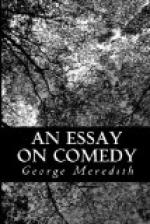The French controversialist is a polished swordsman, to be dreaded in his graces and courtesies. The German is Orson, or the mob, or a marching army, in defence of a good case or a bad—a big or a little. His irony is a missile of terrific tonnage: sarcasm he emits like a blast from a dragon’s mouth. He must and will be Titan. He stamps his foe underfoot, and is astonished that the creature is not dead, but stinging; for, in truth, the Titan is contending, by comparison, with a god.
When the Germans lie on their arms, looking across the Alsatian frontier at the crowds of Frenchmen rushing to applaud L’ami Fritz at the Theatre Francais, looking and considering the meaning of that applause, which is grimly comic in its political response to the domestic moral of the play—when the Germans watch and are silent, their force of character tells. They are kings in music, we may say princes in poetry, good speculators in philosophy, and our leaders in scholarship. That so gifted a race, possessed moreover of the stern good sense which collects the waters of laughter to make the wells, should show at a disadvantage, I hold for a proof, instructive to us, that the discipline of the comic spirit is needful to their growth. We see what they can reach to in that great figure of modern manhood, Goethe. They are a growing people; they are conversable as well; and when their men, as in France, and at intervals at Berlin tea-tables, consent to talk on equal terms with their women, and to listen to them, their growth will be accelerated and be shapelier. Comedy, or in any form the Comic spirit, will then come to them to cut some figures out of the block, show them the mirror, enliven and irradiate the social intelligence.
Modern French comedy is commendable for the directness of the study of actual life, as far as that, which is but the early step in such a scholarship, can be of service in composing and colouring the picture. A consequence of this crude, though well-meant, realism is the collision of the writers in their scenes and incidents, and in their characters. The Muse of most of them is an Aventuriere. She is clever, and a certain diversion exists in the united scheme for confounding her. The object of this person is to reinstate herself in the decorous world; and either, having accomplished this purpose through deceit, she has a nostalgie de la boue, that




